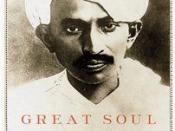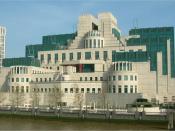Who Is Kim, What Is Kim?
By birth Kim is a white, Irish boy, Kimball O'Hara, whose father was a soldier in an Irish regiment. But, as we see in Chapter 1, he has grown up, as an orphan on the streets of Lahore, 'a poor white of the very poorest', looked after by a half-cast woman, probably a prostitute; 'she smoked opium and pretended to keep a second-hand furniture shop by the square where the cheap cabs wait'. With his skin 'burned black as any native' he looks and lives like a low-caste Hindu street-urchin, unable to read or write, or speak English very well, and known to all as 'Little Friend of all the World'. So right from the start he is neither wholly British nor wholly Indian, and his being neither wholly one nor the other, but a unique 'mixture o' things' (Ch.6 p.160)
remains a constant in his quest for his identity.
As a spy, Kim will have to renounce ordinary life. He will lead a life of disguise and deception, never able to reveal his true motives to anyone. Any attachments he makes to other people will have to be subordinate to his obscure mission, his secret commitment to an ideal. And just as the lama's mission will only be understood by a select few among Buddhist holy men, Kim's mission will only be understood by a select few among the British Secret Service. These two quests, the lama's for the 'Great Soul' and Kim's to play the 'Great Game' of spying, seem as different as can be. One could hardly imagine that two such contrasting ambitions could be yoked together. And yet the two become interdependent, Kim's association with the lama providing him with an excuse to travel around India, and an ideal cover for his true role as a spy, while the lama often relies on Kim to do their begging and find them shelter, often physically leaning on Kim's shoulder as they travel. They sustain each other, the lama providing Kim with emotional and spiritual support, while sustaining himself by drawing on Kim's youthful energy.
In the final chapter, as well as receiving 'mothering', Kim comes as close as he ever does to feeling he has discovered his identity:
"I am Kim. I am Kim. And what is Kim? His soul repeated it again and again . . . tears trickled down his nose and with an almost audible click he felt the wheels of his being lock up anew on the world without." (Ch.15 p.331)
So, what is the identity, which Kim has forged for himself? Who is Kim? There is no definitive statement, but at the end he seems to have arrived at a sense of self towards which he has been struggling, and which he has been defining cumulatively through his experiences. He seems to have found an adult role in which he can be true to himself as he really is, a 'mixture o' things' (Ch.6 p.160), neither wholly Indian nor wholly British, and in which he can maintain the detachment from everyday life and commitments, which united him to the lama. As a secret agent his being a mixture of Indian and British will be an advantage, and he can devote his life to helping to preserve the stability of the British-Indian world he grew up in, which nurtured him like parents. He can remain true to his emotional and spiritual roots, which are mainly native, and does not have to betray them by becoming a Sahib. 'I am not a Sahib' he insists in the final chapter (Ch.15 p.319). He has accepted and developed the European component of his character as much as he wants to, but he does not have to become a white ruler himself. There is too much of the native in him for him to do that. He refused to become a soldier (Ch.5 p.141) and it suits him to serve the sahibs discreetly, tangentially, in a way that makes use of his native instincts and experience, through his role in the Secret Service.
Kimball O'Hara has found an adult role in which he is special, above the rest, and in which he can work on his own initiative, just as he did as a child on secret missions across the rooftops of Lahore. 'I am Kim' he states at the end, but there is still a question there, 'What is Kim?' There is no answer to that question, but perhaps the important thing is that he has remembered to ask it. Perhaps in his heart the Kim he has finally found is, and always had been, the Kim who remembers to ask that question, even though there is no answer.




